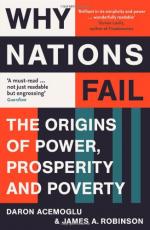|
This section contains 522 words (approx. 2 pages at 400 words per page) |

|
Why Nations Fail: The Origins of Power, Prosperity, and Poverty Summary & Study Guide Description
Why Nations Fail: The Origins of Power, Prosperity, and Poverty Summary & Study Guide includes comprehensive information and analysis to help you understand the book. This study guide contains the following sections:
This detailed literature summary also contains Topics for Discussion on Why Nations Fail: The Origins of Power, Prosperity, and Poverty by Daron Acemoğlu.
Why Nations Fail: The Origins of Power, Prosperity and Poverty, by economists Daron Acemoglu and James Robinson, is an attempt to answer one of economics' oldest and most important questions: why are some nations rich and others poor? After setting aside a number of common theories that answer the question with theories about geography, genetics and culture, the authors argue that the best explanation of the distribution of wealth in the world is institutional.
Specifically, the authors argue that rich countries are rich by virtue of having "inclusive institutions" or economic and political institutions that include the large majority of the population in the political and economic community. Inclusive institutions are democratic, in that they allow mass publics to vote and protect free speech such that political institutions respond to the interests of all persons. Inclusive institutions also set out clear property rights that are reliably enforced by adequate legal systems. They also tend to invest in technologies that benefit all persons and they treat persons equally under the law. Inclusive economies include England, the United States and, relatively recently, South Korea.
Poor countries are poor because they have "extractive institutions" or economic and political institutions that restrict economic gains to an elite political class and ensure that wealth is redistributed "upward," impoverishing the poor. Extractive institutions are anti-democratic and do not define and enforce property rights or protect the rule of law. Examples of extractive institutions include the economies of Mexico, Somalia and North Korea. The authors emphasize that while extractive economies can grow, their growth tends to be unsustainable and skewed towards the upper classes.
The authors theorize that the reason that countries have inclusive rather than extractive institutions is due to their institutional history. Due to institutional "drift," countries can gradually move in extractive or inclusive directions and back again. On top of that, inclusive and extractive institutions are both self-reinforcing. The authors call a self-reinforcing set of inclusive institutions a "virtuous circle" and self-reinforcing sets of extractive institutions as caught in "vicious circles." So while nations can, over their histories, develop in one direction or another, they tend to get caught in a generally inclusive or extractive pattern. Due to the powerful forces of institutional drift, external interventions into extractive economies have generally proved to be failures. Foreign aid and humanitarian intervention provide temporary solutions at best. The only way for poor countries to develop is for them to throw off their extractive institutions and move in an inclusive direction. They must make use of "critical junctures" in institutional history that allow for a nation to take new political directions.
Why Nations Fail is not a work of pure economic theory, however, since the lion's share of the book is occupied with illustrating the foregoing claims in great detail. The authors treat us to sharp contrasts, such as the relative economic statuses of Nogales, Arizona and Nogales, Mexico or the staggering contrast between geographically and culturally similar North and South Korea. The authors also take the reader through economic history and try to show how England developed inclusive institutions from the 16th century on.
Read more from the Study Guide
|
This section contains 522 words (approx. 2 pages at 400 words per page) |

|



